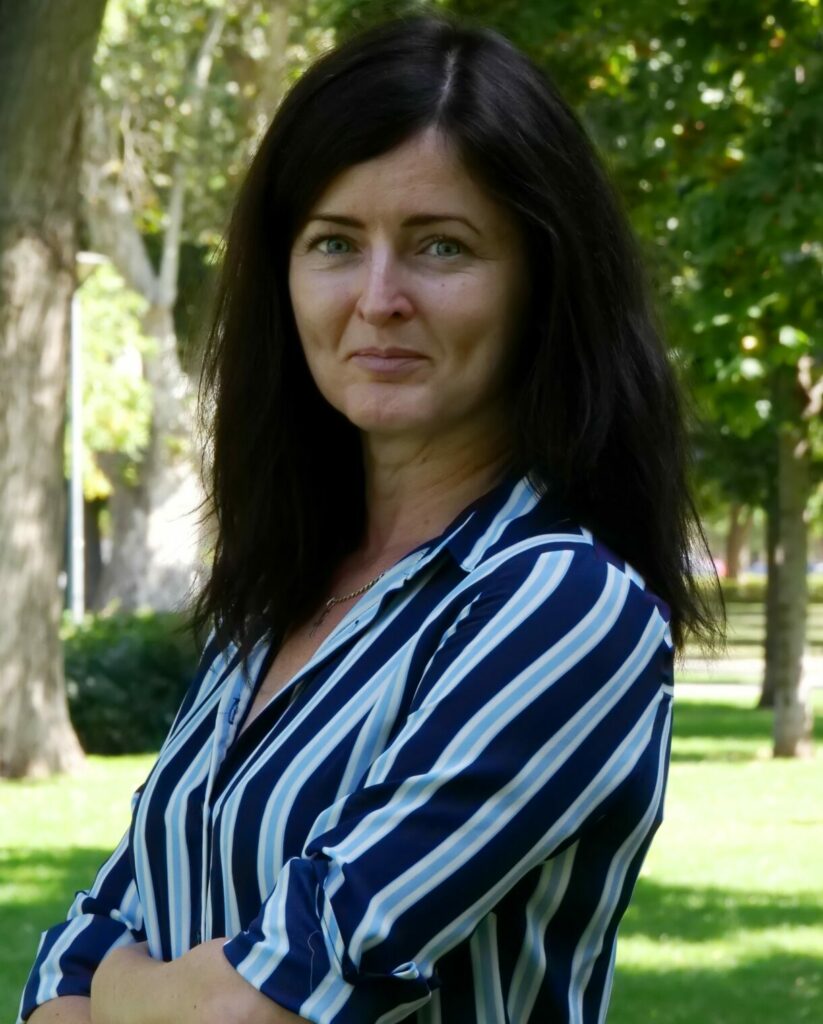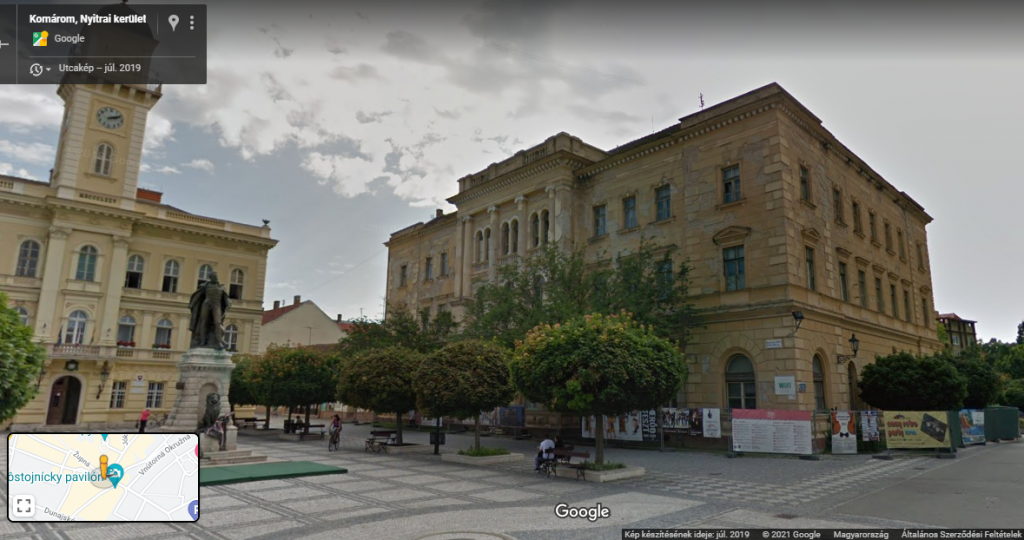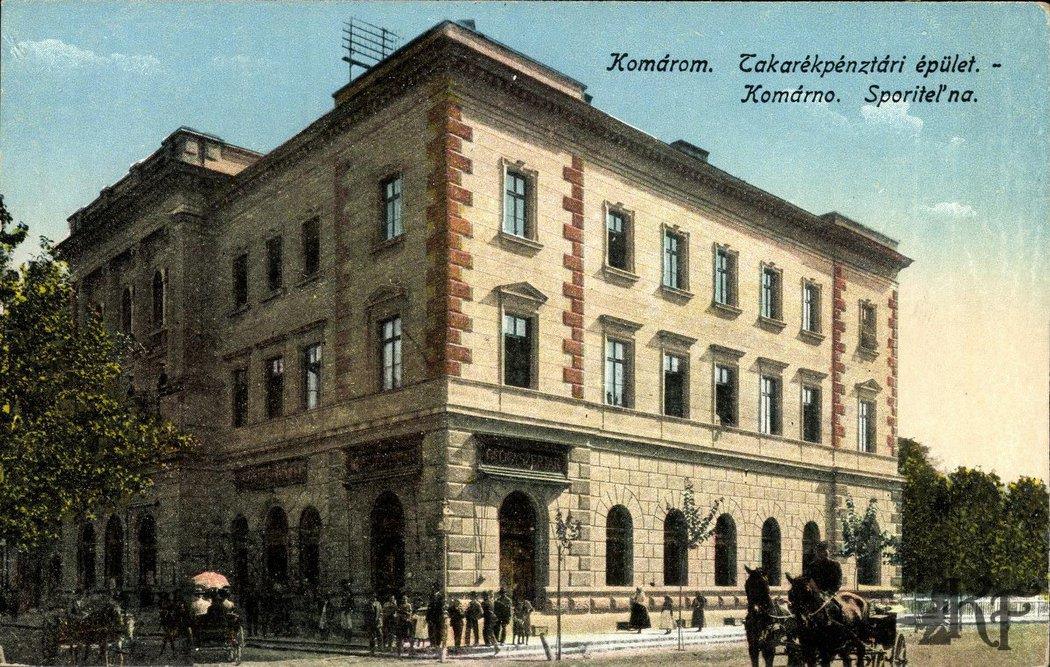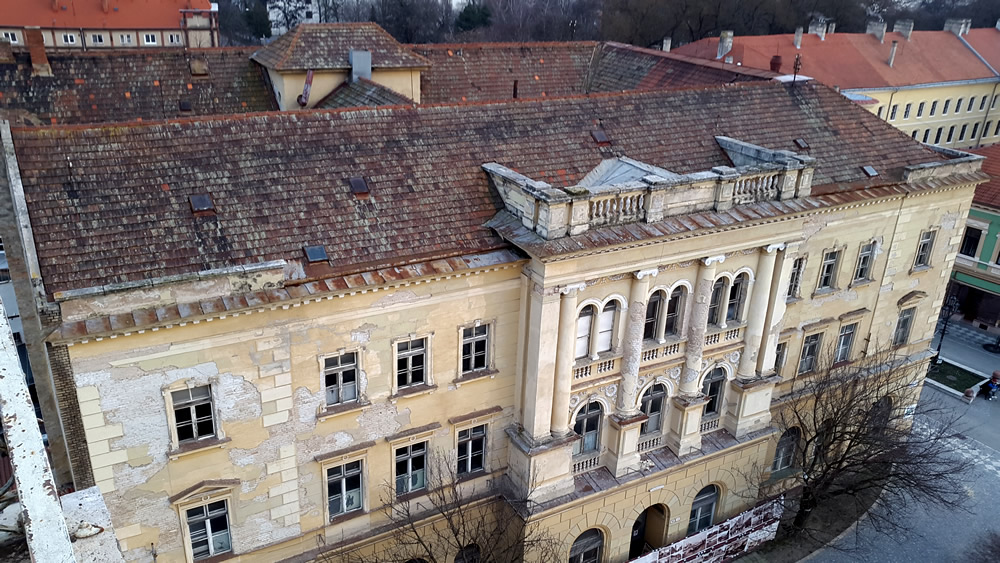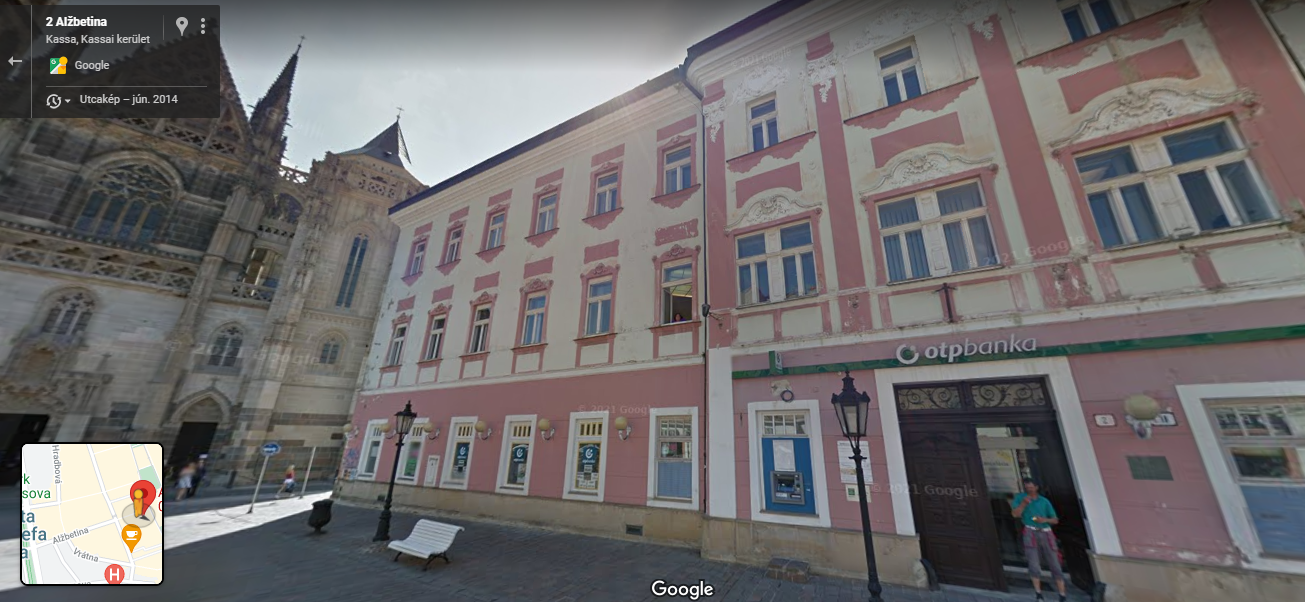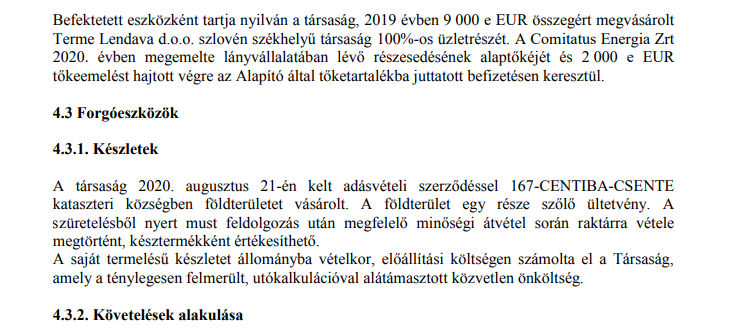The https://english.atlatszo.hu use cookies to track and profile customers such as action tags and pixel tracking on our website to assist our marketing. On our website we use technical, analytical, marketing and preference cookies. These are necessary for our site to work properly and to give us inforamation about how our site is used. See Cookies Policy
Hungarian-owned company is bidding to buy a historical building in Komárno
The huge building, known as the “Polyclinic”, was acquired by the Komarno municipality in 2012 and has been in a very poor state ever since. In 2016, they lobbied for funding from the Hungarian state, but without any success. Recently Manevi SK has announced that it would like to buy it. However, the city did not immediately sell the property, but put it out to public tender for 268,000 euros (about 99 million forints). The procedure is still under way, but in the meantime Manevi SK has changed ownership: it is no longer owned by Manevi Zrt. but by another former state-owned company, Comitatus-Energia Zrt.
Designed by architect Béla Ney, the two-storey building was completed in 1844 on the site of the former Golden Cross House in the heart of northern Komarno, on Klapka Square. For a long time it was used as a clinic, hence the name ‘Polyclinic’.

Around 2003, it ceased to provide health services and the building, which was already in poor condition, began to deteriorate even further. In 2012, it was acquired by the municipality of Komarno. Its estimated worht was €797,000, the city gave land to Nitra County in exchange, for the same amount. But by the time the municipality acquired the building, it was already in a terrible state, and there was no money to renovate it. Because of this, they even tried to sell it in 2013, but failed, so in 2016 they approached the Hungarian government for help.
HUF 1.5 billion was at stake
János Árpád Potápi, Hungarian Minister of State for National Policy of the Prime Minister’s Office, visited Slovakia in January 2016. At the meeting, Deputy Mayor of Komarno, Imre Knirs said that Potápi was presented with plans for the renovation of the Polyclinic, because “the Hungarian state has a framework for financing the renovation of historical buildings abroad”. According to him, the renovation costs were estimated at €5 million (HUF 1.5 billion). A video by Komárom Online in February 2016 shows how the once beautiful building was already in a terrible state:
Later, at the end of March 2016, Zsolt Virág, Ministerial Commissioner of the Prime Minister’s Office for the National Castle Programme also visited the city, and discussed the renovation of the Polyclinic – the municipality even ordered architectural visualisation plans from Olivér Csémy.
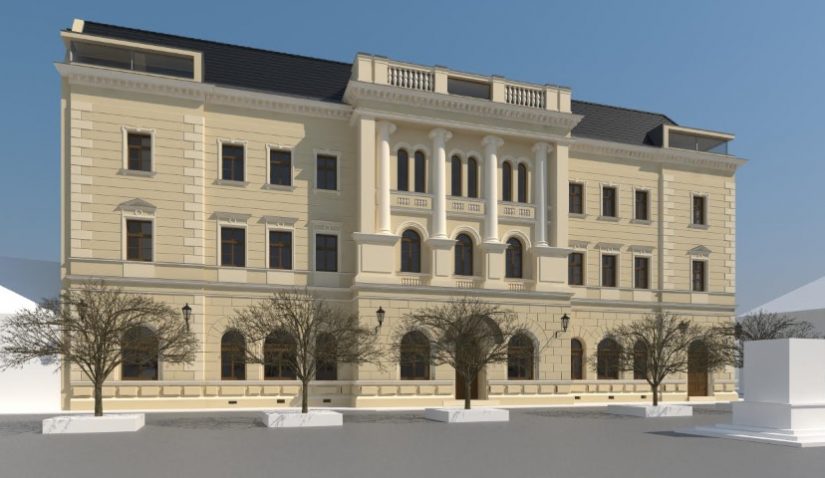 Architectural visualisation plans for the Policlinic by Olivér Csémy
Architectural visualisation plans for the Policlinic by Olivér Csémy
After the meeting, Deputy Mayor told local newspaper Szia Komárom that “Negotiations are going in the right direction, I am confident that we will succeed in getting this amount.” Soon after his visit, Sándor Lezsák, Vice-President of the Hungarian Parliament, also went to the city to talk about the educational function of the building, which could become a centre for young people.
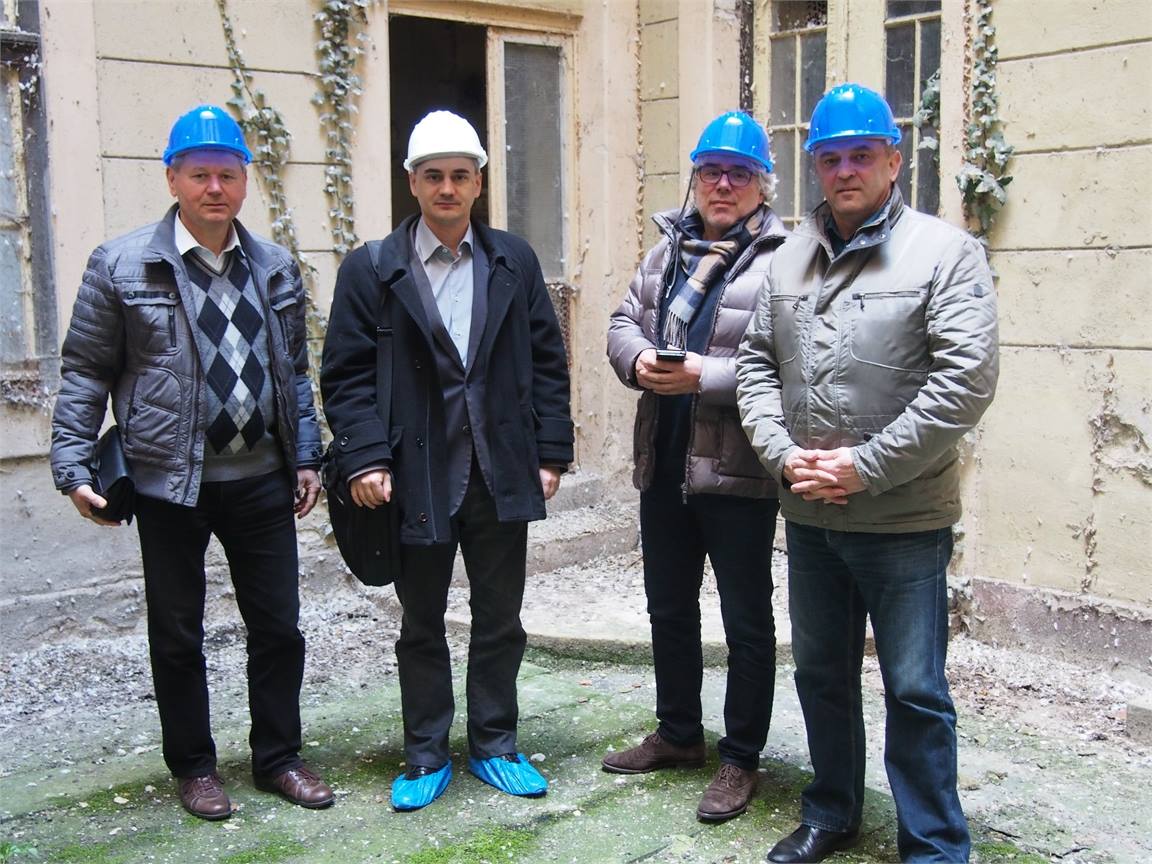
Viktor Bura, Dr. Zsolt Virágh (in white helmet), Olivér Csémy and Imre Knirs at the former Polyclinic on 24 March 2016 (photo: Mesto Komarno/Facebook)
No agreement was reached
Despite the promising prospects, no progress has been made on the renovation with Hungary’s financial support. Later, the municipality tried to sell the Polyclinic again in 2019. However, only one bid was received and was rejected because the bidder offered only €80,000 (around HUF 26 million at the then exchange rate) for the building, which it wanted to convert into a 4-5 star hotel.
In 2020, the Komarno Municipality decided to try to renovate the building with their own funds, thus, they voted 120,000 euros (about 42 million forints) to prepare the necessary design documentation. The result of the tender was announced at the beginning of this summer: the company Akvadrát s.r.o., won the contract.
According to information from Ma7.sk, the municipality has spent only €31,775 (about HUF 11 million) on “renovation works” at the Polyclinic since it took over ownership in 2012: cleaning the eaves, boarding up the windows, patching the roof, removing dangerous elements from the facade and the spilling plaster.
However, in August 2021, the current mayor of Komarno, Béla Keszegh stated that the cost of renovating could rise from €5 million to €7 million (around HUF 2.5 billion) due to the increasing prices of building materials.
In September 2021, following a petition from an NGO, the Slovakian Office for the Protection of Monuments and Sites launched an administrative procedure to declare the former Polyclinic a national cultural monument. As a result, the interior can only be redesigned in a much more restrictive way, which, according to the mayor, will lead to a significant increase in costs and the need to vary the already existing plans.
Manevi SK could buy the building for 268 thousand euros
“We have received an offer to buy the property from Manevi SK (…) As a result, we will launch a public tender, which means that the property will not be sold immediately to the Hungarian bidder” – Ingrid Szabó, head of the office, told Ma7 on 12 November 2021.
Because of the fact that as the Polyclinic is a historical monument, the Slovak state has the right of first refusal on it, so before the tender was launched, the municipality had to send a letter to the Slovak Ministry of Culture.
On 11 November 2021, Komarno City Council voted unanimously to put the building up for tender for 268,000 euros (around 99 million forints). According to FelvidékMa, Imre Knirs – who as deputy mayor had previously tried to get the building renovated with Hungarian state money – expressed concern about Manevi SK, saying that a company registered only six months ago was interested in the property and who knows what it would do with it.
“They have bought several properties in Romania, their whole activity consisted of practically sealing off buildings there and boarding up windows.” – Knirs said, obviously referring to Manevi Zrt, the company that founded Manevi SK, which has bought several properties in Transylvania in recent years. Knirs’ concerns are not unfounded, as a few days ago Átlátszó Erdély showed the state of the Pannónia Hotel in Satu Mare, which was bought by Manevi in 2017 and has not been touched since.
However, MP Dávid Kovács tried to reassure Imre Knirs, by saying that he knows who is behind Manevi SK advised: “We have reached the point where finally the person you wanted to come for the building is coming for the building.”
On 30 November 2021, Új Szó found out that the ministry had sent its response to the municipality, indicating that the Slovak state does not want to buy the property. This means that they could soon put it up for tender at the starting price of €268,000 (about HUF 99 million) agreed at the 11 November council meeting, and will wait for applications until 15 January. If Manevi SK makes the best bid, or if no other bidder bids, it could become the new owner.
Manevi SK has a new owner
According to the local company registry, since 17 November 2021, Manevi SK is no longer owned by Manevi Zrt., but by Comitatus-Energia Zrt., another formerly state-owned company. In fact, this was not a big change, as both Manevi and Comitatus became the property of the Foundation for Preserving Built Heritage in Central Europe in March 2021.
This means that Manevi SK’s properties in Slovakia remain in the hands of the trust foundation, which is staffed with people close to the Hungarian government.
The properties of Manevi SK were collected by the Ján Kuciak Investigative Centre (ICJK) at the end of October this year. They revealed that in February Manevi Zrt. bought two properties in Bratislava that used to be the buildings of the Hungarian Embassy and the Cultural Institute of the Republic of Hungary. Since their investigation, however, there have been some changes: on 23 November 2021, Manevi SK took over the properties in Sedlárska ulica (Nyerges Street) and Védcölöp ulica (Palisády).
As far as we know, Manevi SK owns 5 properties in Slovakia: the monument in Košice, the spa in Trenčianske Teplice, the monastery in Šahy, and the two buildings in Bratislava.
Data request without any answer
Now that Comitatus-Energia Zrt. is the owner of Manevi SK, it indirectly owns the real estate in Slovakia. This represents a significant portfolio increase, as the company previously owned ‘only’ one thermal spa in Lendava, Slovenia.
In 2018, the then state-owned company bought the Terme Lendava tourist complex, which includes the three-star Hotel Lipa, for €9 million. There is also a football academy near the Lendava resort, which receives a lot of Hungarian public money. Gábor Végh, majority owner of ZTE, has been the president of the Lendava football team NK Nafta 1903 since 2017.
At the beginning of our research on the properties of the Foundation for Preserving Built Heritage in Central Europe, we requested a public data request from Comitatus, asking for a list of foreign properties owned by the company, containing the exact addresses, their value, the date of acquisition, the type of acquisition (purchase, gift, exchange), the purchase price and the seller in case of purchase, the intended use, the (estimated) cost of use and the intended date of occupation.
Comitatus Üzletviteli és Tanácsadó Kft., a company owned by the Hungarian State, replied, stating that they did not have any foreign properties and did not have any data on Comitatus-Energia Zrt. On 6 October, we sent a new email to Comitatus-Energia Zrt., but we have not received any reply since then, despite sending a reminder at the end of October.
The company bought a vineyard in Slovenia
When we last wrote about Comitatus-Energia Zrt., the company’s annual report for the previous year was not yet available. Since then, however, it has been published, and the supplementary annex contains new pieces of information.
One is that Comitatus-Energia Zrt. has increased the share capital of its Slovenian subsidiary which owns the Lendava wellness centre, by EUR 2 million (approximately HUF 700 million). The other is a real estate acquisition.
“The company has acquired land in the cadastral municipality of 167-CENTIBA-CSENTE by a sale and purchase agreement dated 21 August 2020. Part of the land is vineyard.”
According to Wikipedia, Csente (until 1974 Csentevölgy, in Slovenian: Čentiba) is a village inhabited by Hungarians in the Muravian region of Slovenia. It is administratively part of the municipality of Lendava with a population of about 800 inhabitants.
We are curious to see what previously unknown property acquisitions will be revealed in the company’s 2021 report next year. It is quite possible that by then Manevi SK will have bought the Polyclinic in Komárno, and possibly other real estate as well.
Translated by Zita Szopkó. The original, more detailed Hungarian version of this article was written by Katalin Erdélyi and can be found here. The article was written in the framework of a joint project of Átlátszó and Átlátszó Transylvania, with the support of News Spectrum.
Cover photo: the former Polyclinic in Komárno, Slovakia (photo: Google)
Support independent investigative journalism in Hungary, become a patron of Atlatszo on Patreon!
Share:
Your support matters. Your donation helps us to uncover the truth.
- PayPal
- Bank transfer
- Patreon
- Benevity
Support our work with a PayPal donation to the Átlátszónet Foundation! Thank you.
Support our work by bank transfer to the account of the Átlátszónet Foundation. Please add in the comments: “Donation”
Beneficiary: Átlátszónet Alapítvány, bank name and address: Raiffeisen Bank, H-1054 Budapest, Akadémia utca 6.
EUR: IBAN HU36 1201 1265 0142 5189 0040 0002
USD: IBAN HU36 1201 1265 0142 5189 0050 0009
HUF: IBAN HU78 1201 1265 0142 5189 0030 0005
SWIFT: UBRTHUHB
Be a follower on Patreon
Support us on Benevity!
